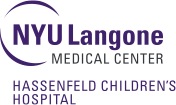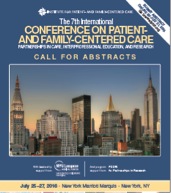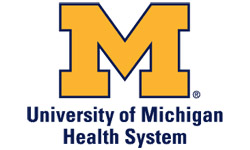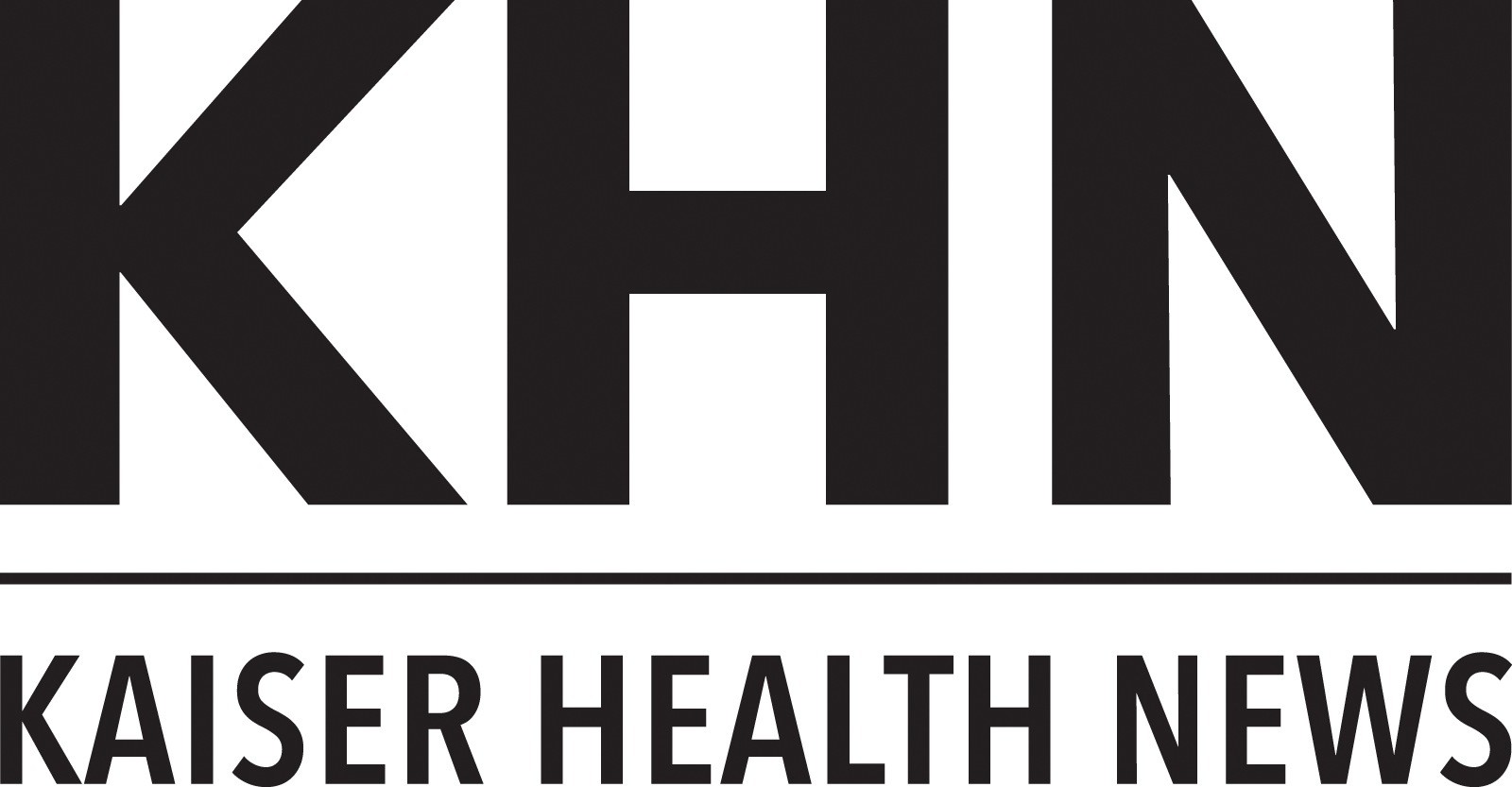 |
|
|
| |
|
The 7th International Conference on Patient- and Family-Centered Care: Partnerships in Care, Interprofessional Education, and Research — July 25-27, 2016 in New York City
|
|
SAVE THE DATE
With leadership support from:

And program support for
Partnerships in Research from:
PCORI
IPFCC's 7th International Conference on Patient- and Family-Centered Care will be held at the New York Marriott Marquis at Times Square, July 25-27, 2016. Mark your calendars and plan a long weekend to explore this amazing city with family, friends, and colleagues!
 The Call for Abstracts for this exciting meeting will be available in June 2015. The Call for Abstracts for this exciting meeting will be available in June 2015.
The 7th International Conference on Patient- and Family-Centered Care will showcase innovative and exemplary programs dedicated to collaboration among health care professionals, patients and families. Emerging issues in patient- and family-centered care at the direct care level—as well as at the organizational, community, regional, and national levels—will be addressed. The conference will feature plenary sessions, concurrent/topical breakout sessions, networking opportunities, and poster presentations.
IPFCC invites you to submit an abstract featuring the best of your organization's patient- and family-centered care programs and practices.
The Conference Abstract Review Committee gives priority consideration to submissions that:
- Include patients or families as presenters or co-presenters; and
- Highlight meaningful collaborative roles for patients and families in all aspects of programs, projects, or initiatives.
Abstracts are also reviewed on the following criteria:
- Consistent with patient- and family-centered care core concepts;
- Innovative;
- Replicable;
- Evidence-based; and
- Effective.
Details about the review criteria will be available on the online abstract submission site. More information about the Call for Abstracts will be posted on the IPFCC website in early June.
|
Creating Capacity for Sustainable Partnerships with Patients and Families in Research – A New PCORI-Funded Project
|
IPFCC is proud to announce an award from the Patient-Centered Outcomes Research Institute (PCORI) for a new two-year project, Creating Capacity for Sustainable Partnerships with Patients and Families in Research. The funding will support a special research track at The 7th International Conference on Patient- and Family-Centered Care: Partnerships in Care, Interprofessional Education, and Research (see previous article). The featured track will highlight exemplary partnerships with patients and families in research initiatives, and share best practices and resources for preparing patients, families, and researchers to collaborate.
IPFCC will engage in extensive pre-conference outreach to patient and family advisory councils, other patient and family advisors, consumer organizations, and researchers in order to build capacity for the councils and researchers to serve as partners in research. Based on the learning from the outreach and the featured research track, IPFCC will develop and disseminate practical training materials for other organizations and their patient and family advisory councils, to create effective partnerships in planning and conducting research and in disseminating research findings. For more information about this project, contact Marie Abraham.
PCORI is an independent, non-profit organization authorized by Congress in 2010 to fund comparative effectiveness research that will provide patients, their caregivers, and clinicians with the evidence needed to make better-informed health and health care decisions. PCORI is committed to seeking input from a broad range of stakeholders to guide its work.
|
University of Michigan Health System Video Showcases PFCC Leadership: Patient & Family Centered Care: A New Attitude
|

University of Michigan Health System's (UMHS) recently released video, Patient & Family Centered Care: A New Attitude, showcases its leadership in Patient- and Family-Centered Care (PFCC).
The video shows just what UMHS means by PFCC. Filmed at the Frankel Cardiovascular Center, University of Michigan Health System, the video displays patients and families being embraced as vital and central members of their health care team. The teaching hospital conducts multidisciplinary rounds at the bedside in partnership with patients and their families, and nursing change of shift is done at the bedside including patients and families in the process. Clinicians, administrators, patients, and families are featured in the video describing the PFCC practices, and the benefits of these practices, including better outcomes.
UMHS has more than 300 patient and family advisors serving on health system committees. Advisors are recruited, trained, and placed on key committees and projects. In addition to the stories, experiences, and opinions that they share, advisors bring the patient and family perspective to hospital operations and management. Advisors serve in a myriad of ways as described on the UMHS website. Read about various PFA Councils at UMHS.
In the IPFCC Better Together campaign, UMHS is recognized as an exemplar for its family presence policy, welcoming patients’ families and loved ones to be with the patients 24 hours a day. “Engaging and welcoming our patients and families in care decisions is very important to us,” says Kelly Parent, manager of the Patient & Family Centered Care Program at UMHS C.S. Mott Children’s Hospital. “The high satisfaction scores we’ve seen from patients, families, and our staff show that our efforts to include patients and families at all points of care are paying off …. “Not only do families and loved ones provide much-needed emotional support, but they help us do our jobs better,” says Parent. “They know more about the patients than we could ever know, which is critical in the healing process.” [Learn more about Kelly Parent in the side article.]
Read about IPFCC’s Better Together campaign, and all the hospital exemplars.
Congratulations to UMHS for leading the way!
|
Hospitals Increasingly Partnering with Patients and Families for Advice |
|
 In Hospitals Increasingly Turn To Patients For Advice, published April 27, 2015, by Kaiser Health News,* author Shefali Luthra reports about the growing trend in hospitals to use patient and family advisory councils [PFACs]. Advisory councils “… often serve as sounding boards for hospital leaders—offering advice on a range of issues. Members are usually patients and relatives who had bad hospital experiences and want to change how things work, or who liked their stay and want to remain involved…. This hunt for patient perspective, which is becoming more and more common, is fueled in part by the health law’s quality-improvement provisions and other federal financial incentives, such as the link between Medicare payments and patient satisfaction scores.” In Hospitals Increasingly Turn To Patients For Advice, published April 27, 2015, by Kaiser Health News,* author Shefali Luthra reports about the growing trend in hospitals to use patient and family advisory councils [PFACs]. Advisory councils “… often serve as sounding boards for hospital leaders—offering advice on a range of issues. Members are usually patients and relatives who had bad hospital experiences and want to change how things work, or who liked their stay and want to remain involved…. This hunt for patient perspective, which is becoming more and more common, is fueled in part by the health law’s quality-improvement provisions and other federal financial incentives, such as the link between Medicare payments and patient satisfaction scores.”
Patients interviewed for the story about their experiences on advisory councils included Jane Maier, who was a patient at Brigham and Women’s Faulkner Hospital, and Carol Cronin, whose relative was a patient at Johns Hopkins Hospital. Both Brigham and Women's Hospital and The Johns Hopkins Hospital are IPFCC Pinwheel Sponsors. Cronin was struck by the “meaty” topics advisory councils address. Examples given in the article include:
- Selection process for an electronic health record system;
- Quality and safety issues, such as reducing confusion and anxiety that can lead to delirium in ICU patients;
- Improving security;
- Improving the billing processes;
- Participating in hiring process for clinicians;
- Improving response times to call buttons;
- Decreasing nighttime noise on the floors; and
- Speaking at a hospital leadership retreat.
Higher patient satisfactions scores often result from improvements made.
For some hospitals and health systems, though, these advisory councils are just the beginning. Massachusetts General puts patients on various policy-setting committees, and Brigham and Women’s Faulkner Hospital has a non-voting patient board member. “As we continue to evolve,” Maier said, “the hospital looks to us more and more.”
PFACs can’t operate in isolation. In the article, IPFCC’s Senior Policy and Program Specialist, Mary Minniti, is quoted: “Patient and family advisory councils are useful if they have the ear of hospital leaders. But the groups also have to be integrated into decision-making.” For example, many hospitals and health systems integrate patient and family advisors into policy setting committees, and seek out input from advisors on a breadth of projects, policies, and practices.
Read the PFAC annual reports posted on IPFCC’s website to learn more about what PFACs have accomplished all across this country and Canada.
IPFCC invites PFACs to submit annual reports to be added to its website. Contact Barbara Kahl.
Read the entire KHN article.
* Kaiser Health News (KHN) is a nonprofit national health policy news service. This KHN story also ran in USA Today.
|
|
In This Issue |
- The 7th International Conference on Patient- and Family-Centered Care: Partnerships in Care, Interprofessional Education, and Research—July 25-27, 2016 in New York City
- Creating Capacity for Sustainable Partnerships with Patients and Families in Research – A New PCORI-Funded Project
- University of Michigan Health System Video Showcases PFCC Leadership: Patient & Family Centered Care: A New Attitude
- Hospitals Increasingly Partnering with Patients and Families for Advice
- Meet Kelly Parent—IPFCC’s New Program Specialist for Patient and Family Partnerships
- IPFCC's June Webinars—Two New Topics
- IPFCC's Toolkit for Better Together Campaign Featured in Your Role in Family-Centered Health Care
- Tribute to Dr. Lucian Leape
- Health Risk Management Week: June 15-19, 2015
|
| Meet Kelly Parent—IPFCC’s New Program Specialist for Patient and Family Partnerships |
 Kelly Parent recently joined IPFCC's staff in a part-time capacity to serve as a Program Specialist for Patient and Family Partnerships. She will provide outreach to Patient and Family Advisory Councils (PFACs) as part of the PCORI-funded grant, Creating Capacity for Sustainable Partnerships with Patients and Families in Research, described in the separate PCORI article. Kelly will also be the Administrator for the PFAC Network, IPFCC’s online discussion forum. Kelly Parent recently joined IPFCC's staff in a part-time capacity to serve as a Program Specialist for Patient and Family Partnerships. She will provide outreach to Patient and Family Advisory Councils (PFACs) as part of the PCORI-funded grant, Creating Capacity for Sustainable Partnerships with Patients and Families in Research, described in the separate PCORI article. Kelly will also be the Administrator for the PFAC Network, IPFCC’s online discussion forum.
Kelly has served for five years as faculty for IPFCC’s seminars, webinars, and conferences, and participated on IPFCC consulting teams to assist hospitals and health systems working to incorporate PFCC concepts into organizational goals.
Kelly will continue her role as a PFCC Program Manager at the University of Michigan Health System (UMHS). In this role, Kelly serves as a coach and consultant to staff and faculty who seek to incorporate PFCC culture change into daily practices and has established and continues to sustain a series of multi-faceted patient and family advisory councils that address clinical, quality and safety, sentinel event, research collaborations, education, governance, and outcomes measurement.
Kelly—who manages hundreds of volunteer advisor placements at UMHS—has developed training programs to educate volunteer patient and family advisors how to effectively participate on organizational committees and clinical, research, and education initiatives. Additionally, she supervises a PFCC intern program for graduate and undergraduate students, collaborates with staff and faculty at UMHS and health science schools to embed PFCC concepts into training and educational programs, collaborates with clinical researchers on grant applications, and manages recognition and accountability models for PFCC culture change.
Under Kelly’s leadership, the PFCC Program at UMHS C.S. Mott Children's Hospital won Support Program of the Year in 2009. [See separate article on UMHS leadership in PFCC.]
Kelly's passion for PFCC was ignited following her daughter's cancer diagnosis, first serving as a volunteer family advisor, and then lobbying Capitol Hill for increased funding for pediatric cancer research and health care programs for under-served children.
|
IPFCC's June Webinars—Two New Topics
|
IPFCC is offering two new Webinars in June! In the first webinar, the important and critical role of the security department in patient- and family-centered care will be explored. The other new webinar explores the application of PFCC concepts to design and planning for renovation and new construction. Taught by experts in the field, both webinars will provide information to help you and your organization effectively implement patient- and family-centered care.
The Role of the Security Department in Patient- and
Family-Centered Care
Wednesday, June 17, 2015
IPFCC Faculty member, Perry Spencer, MS, CPP, CHPA, Interim Director University of Michigan Health System & Hospitals Security Department, will discuss how the security services directors, managers, and staff at the University of Michigan Hospitals & Health Centers have been key partners in advancing patient- and family-centered care.
Applying Patient- and Family-Centered Concepts to Design and Design Planning for Renovation and New Construction Projects
Tuesday, June 30, 2015
Join in the conversation with Beverley H. Johnson, President and CEO, IPFCC, about how to partner with patients and families, front-line staff, and leaders in design planning, and in all phases of the process of construction and the “move in.”
IPFCC’s webinars are a cost-effective educational resource. Cost is per line, so you can assemble a group of any size to participate in the same room on one line. Handouts and supplemental resources are included with registration. There is an optional Question and Discussion segment so participants can discuss topics with IPFCC's faculty.
Learn more about webinar faculty, learning objectives, and Pinwheel Sponsor discounts.
|
IPFCC’s Toolkit for Better Together Campaign Featured in Your Role in Family-Centered Health Care
|

Check out Tamara Brown's article, at app.com, Your Role in Family-Centered Health Care, which discusses the importance of designating a care partner and showcases the TOGETHER poster and pocket guide, part of IPFCC’s Better Together toolkit, to use to participate in the health care of your family members or loved ones.
|
Tribute to Dr. Lucian Leape
|
 At its recent 2015 Safety Congress, the National Patient Safety Foundation (NPSF) paid tribute to Dr. Lucian Leape, founder of NPSF and founding chairman of the NPSF Lucian Leape Institute. Lucian Leape has long been an advocate for partnering with patients and families as an essential strategy to enhance safety. At its recent 2015 Safety Congress, the National Patient Safety Foundation (NPSF) paid tribute to Dr. Lucian Leape, founder of NPSF and founding chairman of the NPSF Lucian Leape Institute. Lucian Leape has long been an advocate for partnering with patients and families as an essential strategy to enhance safety.
View the NPSF video tribute.
|
Links
|
|
|
Previous Issues |
|
|
About Us
|
Founded in 1992 as a nonprofit organization, the Institute for Patient- and Family-Centered Care works to advance the understanding and practice of patient- and family-centered care in all settings where individuals and families receive health care.
|
|
Health Risk Management Week: June 15-19, 2015
|
|

Celebrate the American Society for Healthcare Risk Management (ASHRM) Healthcare Risk Management (HRM) Week, June 15-19, 2015, to raise awareness about risk management. ASHRM—a campaign partner on IPFFC’s Better Together Campaign—will hold a webinar on June 17th. For more information...
|
Institute for Patient- and Family-Centered Care
6917 Arlington Road, Suite 309 • Bethesda, MD 20814
301-652-0281
www.ipfcc.org |
|
|